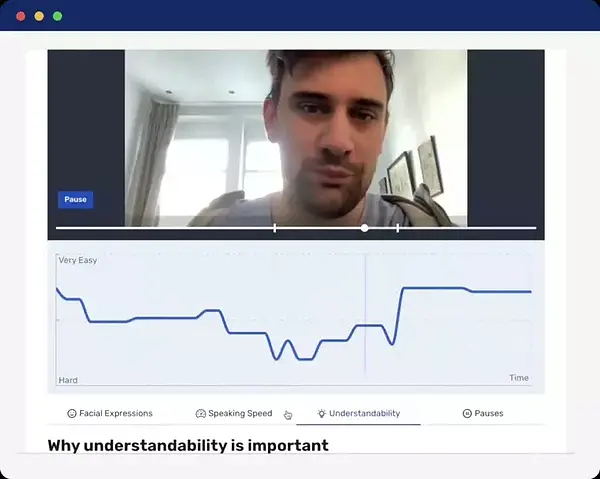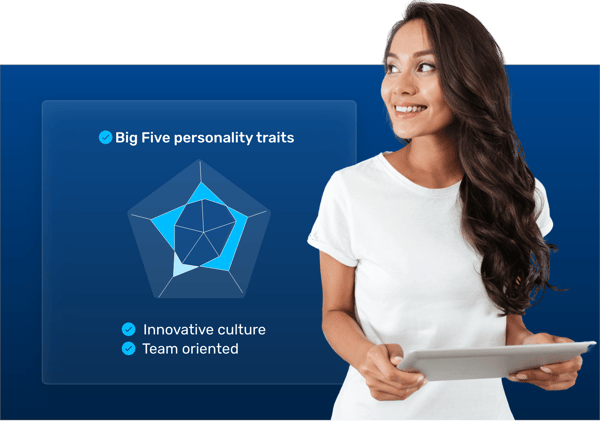Hard skills and soft skills are terms we often hear when talking about job requirements, training, and work; but what exactly are these things?
What is an example of a hard skill, or a soft skill, and when are they important? Are we born with them? Can they be learned?
And more simply, what is the difference between the two types of skills?

In this article, we'll get straight into answering these burning questions.
What’s in this post?
- What are hard and soft skills?
- Examples of hard and soft skills
- Hard and soft skills - which matters in 2022?
- How can you train your soft skills?
- How can AI help train soft skills?
What are hard and soft skills?
The primary and easy-to-understand difference between hard and soft skills is that hard skills are those measurable skills that can be easily defined and specific.
On the other hand, soft skills are those invisible, harder-to-define skills that tend to be harder to measure - the interpersonal skills that help you get along with your colleagues and bosses, how well you understand and contribute to the company culture, how well you can adapt to new changes, and your sense of creativity, all come under the umbrella of soft skills.
Whereas the job-specific skills you’ve acquired for a role, which could be your ability to speak a foreign language, or how well you can do sales, are all skills that are counted as hard skills.
Examples of hard and soft skills
Examples of soft skills may include:
- Ability to “read the atmosphere”
- Communication skills
- Teamwork
- Charisma
- Flexibility and adaptability
- Time management and organizational skills
- Problem-solving
- Stress management
- Critical thinking and decision making
- Openness to criticism
- Conflict resolution
Examples of hard skills may include:
- Copywriting
- Language ability
- Graphic design and proficiency in various programs
- Social media
- Computer Troubleshooting
- Project management
- Photography
- Coding
- Macro/microeconomics
- Patient care
- Presentation skills
Hard and soft skills - which matters in 2022?
It's not an either-or situation; even with the most polished hard skills, without the corresponding soft skills to go with it, you won’t be successful at your job, and vice versa.
Employers are looking for both hard skills and soft skills, but the value of each differs by the employer and the everyday needs of the workplace.
The importance of each type of hard skill for a job role also depends on the industry and role.
For instance, an engineer who isn’t proficient in programming languages isn’t going to interest employers looking for a skilled engineer.
But what are the changes we're seeing in the hiring and training scene in terms of skill shift?
Around the early 2000s, job fit was generally based on degree requirements and hard skills, which was particularly pronounced after the Great Recession of 2008 - 2009. Thus, traditional employee training tended to always revolve around training those hard skills.
This trend sometimes referred to as "degree inflation" has seen a tide turn over the following years.
Companies started to consider what capabilities they were truly after, and employers began to realize that it wasn't simply the qualifications and measurable skills they wanted. It was factors such as communication skills, flexibility to adapt to new unfamiliar changes, how well a worker could get along with their team, and whether or not they possessed leadership qualities that grew in importance.
In fact, research conducted by Harvard University, the Carnegie Foundation, and Stanford Research Center has all concluded that 85% of job success comes from having well‐developed soft and interpersonal skills, and surprisingly just 15% of job success comes from hard skills.
Further, a study by Yale University found that employees with emotionally intelligent supervisors were happier, more creative, and more innovative. And in a 2022 market research when 2,000 UK adults were asked "What skills do you think are the most important for a manager at work to possess, if any?", 'leadership skills' were considered the most important soft skill for managers in the workplace to possess, closely followed by verbal communication and teamwork skills.
This then proceeded to encourage job applicants to be aware of developing these soft skills, and adding them to their CVs.
How can you train your soft skills?
So now we know how to identify and differentiate hard and soft skills, but how can we train them? How can we train these important soft skills that are so vital to the 2022 workplace environment?
Soft skill training has picked up a lot of traction over the past few years as employers have recognized its importance, and as a result, more and more companies are turning to various new ways to train these soft skills. Organizations have invested in various e-learning platforms as well as increased budgets for training methods, however, both aren't without their limitations.
How can AI help train soft skills?
The revolution of artificial intelligence (AI) is not in its infancy, and recent AI simulation technology is focussing heavily on agent skill mastery and changing the game for training programs.

With Retrorio Coaching Platform, you can improve your employees' soft skills by doing online exercises.
Product development teams globally are ceaselessly diving deeper into the capabilities of AI to create solutions to improve soft skills as consumer demands become more complex, varied, and valuable. Training simulations are taking center stage in the call for smarter coaching approaches for customer-facing employers to deliver superior empathetic customer experiences.
These immersive learning strategies are creating ways for employees to solve real work issues that they may face, while in virtual settings.
As the use of machine learning and deep learning makes logical progression, development teams are taking on complex approaches and are seeing not just breakthrough results, but products and services in wide use.
With just a piece of software, AI-powered video simulations allow anyone on their own to run the application and train skills at their own pace, in their own space.
That's why video simulations are so widely used by airline pilots, disaster response teams, and other industries where trainees need to create real-life scenarios to improve their capabilities, such as decision-making (which is difficult in traditional, passive, training settings). Even in the medical world, schools are reaping the rewards of integrating video simulation into their learning programs where they lack labor capital and significant space.

Take, for instance, Retorio, a start-up based in Munich, that helps organizations around the globe take soft skill training to the next level by using cutting-edge AI technology.
By combining video analysis with role-plays of client simulations, Retorio offers interactive training solutions for customer-facing positions, such as sales, consulting, etc where employees can practice training even vital soft skills in a psychologically safe environment, anytime, anywhere.
Want to see how you could use AI to your advantage?


